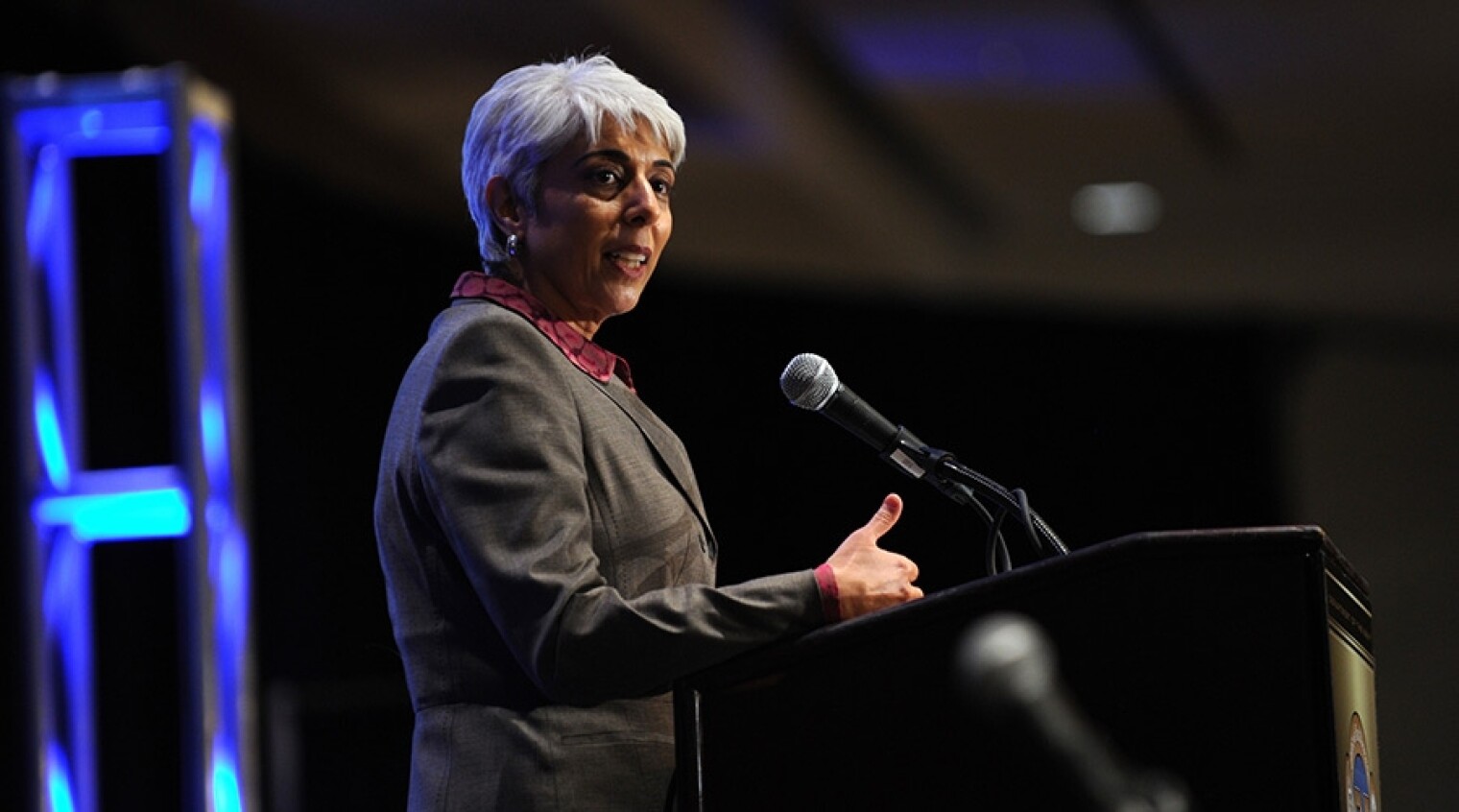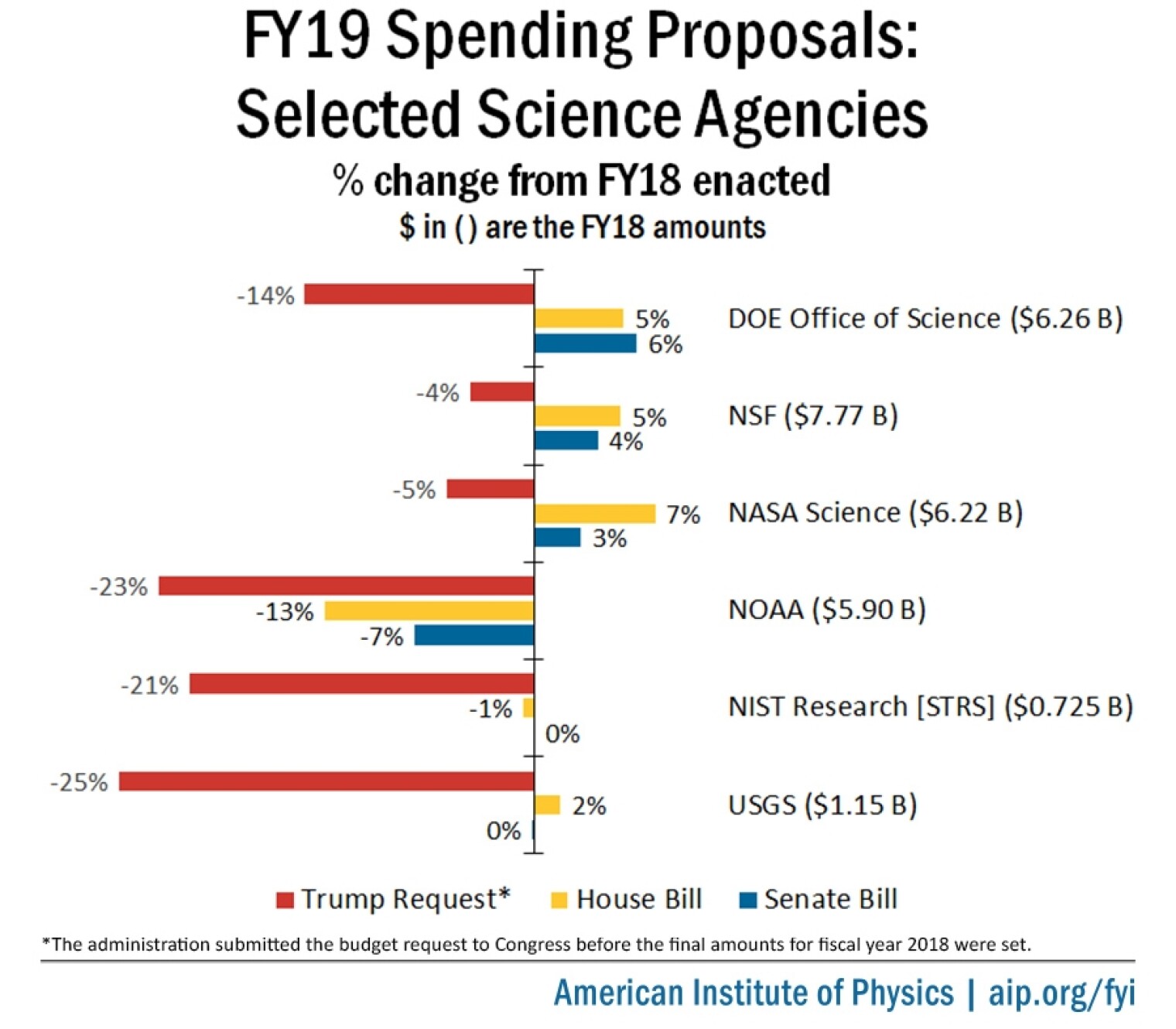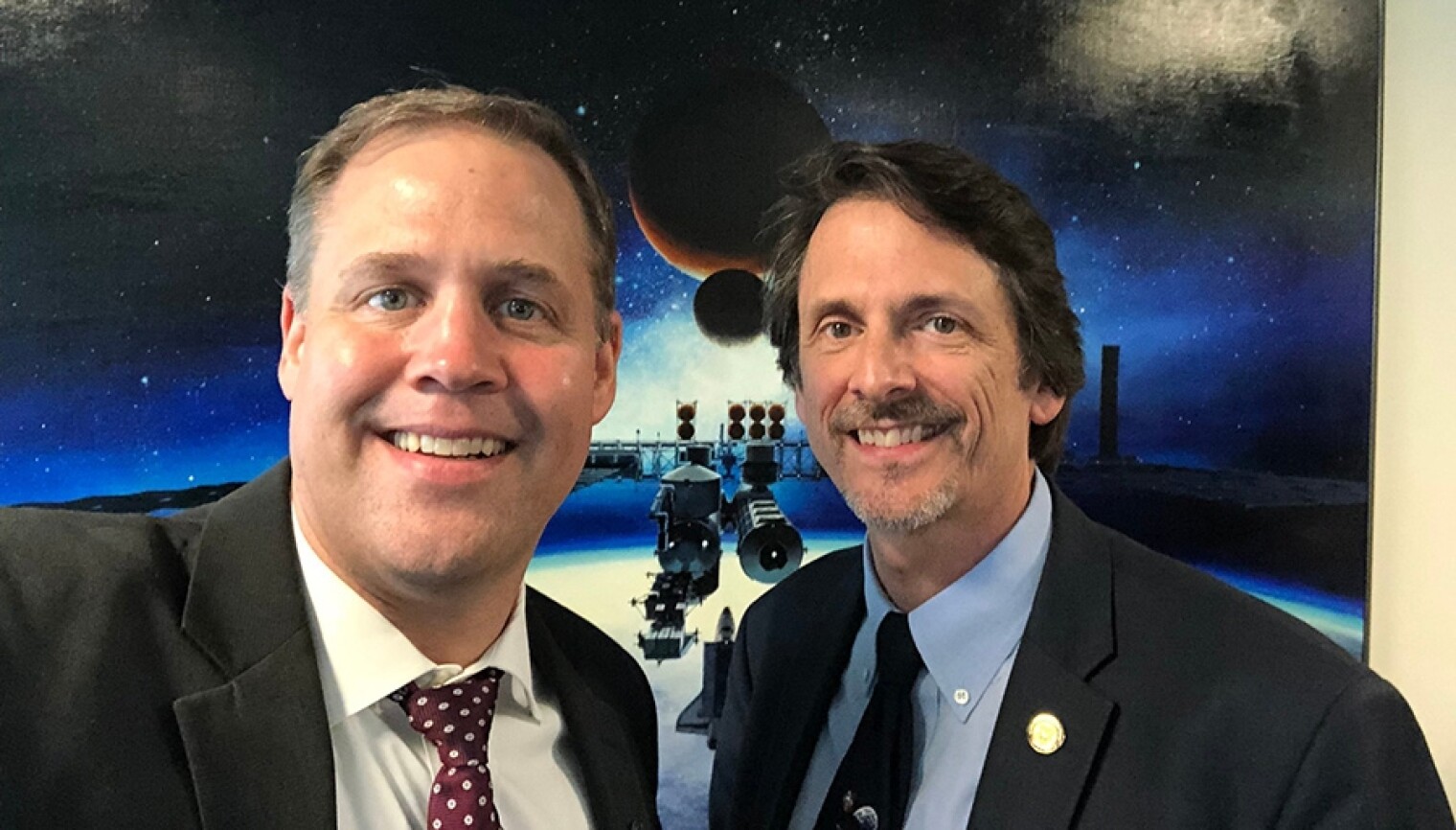| |
What’s Ahead
 |
| Former Defense Advanced Research Projects Agency Director Arati Prabhakar will deliver the William D. Carey lecture at this year’s AAAS Forum on Science and Technology. (Image credit – John F. Williams / Office of Naval Research) |
AAAS Holding Annual Science & Technology Policy Forum
On Thursday and Friday, the American Association for the Advancement of Science (AAAS) will host its annual Forum on Science and Technology, which it advertises as “ the major public meeting in the U.S. on S&T policy issues.” A Thursday morning panel will provide a “ global perspective” on R&D, while an afternoon panel will examine case studies on “ the risks of stranded innovation” in the energy and climate sciences. Thursday evening, former Defense Advanced Research Projects Agency Director Arati Prabhakar will deliver the William D. Carey Lecture on “Renewing R&D’s Promise to America.” Friday’s sessions include a panel with National Institute of Standards and Technology Director Walter Copan and another with National Science Foundation Director France Córdova. The meeting will conclude with an address by NASA astrophysicist John Mather titled, “From Earth to the Cosmos: How Far Can We Go?”
White House Hosting State-Federal STEM Education Summit
STEM leaders and experts from federal agencies, all 50 states, industry, and non-profit organizations will head to the White House next Monday and Tuesday for the State-Federal STEM Education Summit. The event, hosted by the White House Office of Science and Technology Policy, will feed into the development of a new five-year strategic plan for federal STEM education programs, in compliance with requirements set by the 2010 America COMPETES Act. The first five-year STEM education strategic plan was released in 2013. “This event is the first time an administration has asked for this level of state input when developing a federal STEM education strategy,” said Jeff Weld, assistant director for STEM education at OSTP in a statement. “Top-down approaches to STEM education can often yield wonderful ideas, but it’s at the state and community level where the momentum happens. State leaders know best what kinds of programs will work in their communities and where they need the power of the federal government to help drive success in this field.”
House Committee to Examine Military Technology Transfer
The House Armed Services Committee is convening a hearing on Thursday titled, “Military Technology Transfer: Threats, Impacts, and Solutions for the Department of Defense.” Under Secretary of Defense for Research and Engineering Mike Griffin will testify alongside the deputy under secretary of defense for intelligence, the assistant secretary of defense for acquisition, and the national intelligence officer for military issues.
National Academies Committee to Review USGS Labs
A new National Academies study committee is holding its kickoff meeting Sunday and Monday for a project to assess U.S. Geological Survey laboratories, covering energy and minerals, natural hazards, surface and groundwater, ecosystems, and environmental health. The committee will produce a consensus report by late 2019 that will, among other items, provide recommendations on “ensuring the integrity and reliability of results from USGS production laboratories.” The issue of scientific integrity at USGS labs came under scrutiny in 2016 after the agency’s inspector general found that multiple incidents of scientific misconduct had occurred at the Energy Geochemistry Laboratory between 2008 and 2014.
|
|
In Case You Missed It
 |
| Click to enlarge |
Senate Spending Bill Offers Mixed Proposals for Science Agencies
On June 14, the Senate Appropriations Committee approved its fiscal year 2019 Commerce-Justice-Science (CJS) spending bill, which funds NASA, the National Science Foundation, National Oceanic and Atmospheric Administration, and National Institute of Standards and Technology. The bill proposes to increase the budget for the NASA Science Mission Directorate by 3 percent to $6.4 billion, and to increase NSF’s budget by 4 percent to $8.1 billion. It would cut NOAA’s budget by 7 percent to $5.5 billion, accounted for mainly by the ongoing ramp down in funding for weather satellite procurement and the completion of the acquisition of a new Hurricane Hunter aircraft. Similarly, a proposed 13 percent cut to NIST would roll back its historically high fiscal year 2018 budget that was buoyed by a one-time infusion for facilities construction funding. The CJS spending bill has not yet been scheduled for floor action but the full Senate is expected to take up the Energy-Water bill, which funds the Department of Energy this week.
Senate Appropriators Seek Better Technology Advice for Congress
The Senate Appropriations Committee also approved its Legislative Branch spending bill on June 14. The committee’s report on the bill asserts there is “general support in Congress to bolster capacity of and enhance [congressional] access to quality, independent science and technological advice.” The report urges the Government Accountability Office to strengthen its existing capacity for assessing science and technology issues. In addition, it calls for a National Academy of Public Administration study to evaluate Congress’ past and present means of obtaining technology advice, including the defunct Office of Technology Assessment (OTA). The study would also assess potential additional steps for augmenting that advice, including establishing a new technology assessment entity. Earlier this month, the House rejected an amendment to its Legislative Branch spending bill, on a vote of 195 to 217, that would have restored funding to OTA.
House Spending Bills Prune Back Defense S&T Funding...
The House Appropriations Committee approved its Department of Defense spending bill on June 13 on a vote of 48 to 4. The bill includes a record $91.2 billion in funding for DOD’s Research, Development, Test, and Evaluation accounts, exceeding the Trump administration’s request. However, within that, it would reduce the early-stage Science and Technology accounts — Basic Research, Applied Research, and Advanced Technology Development — to $14.4 billion, 3 percent below the current level. Further details about the committee’s proposal can be found in its report on the bill. The House will be accepting proposals for amendments this week ahead of floor debate. The Senate Appropriations Committee plans to consider its Defense Appropriations bill next week.
...and Bump Up Funding for NIH
On June 14, the House Appropriations Committee released its spending bill for the Department of Health and Human Services, proposing $38.3 billion for the National Institutes of Health, a 3 percent increase over current levels. The bill itself, which proposes topline funding levels for each NIH institute, is available here. The committee has not yet released its report, which will convey more detailed funding proposals and policy guidance. The Senate Appropriations Committee plans to take up its counterpart bill next week.
National Academies Releases Report on Sexual Harassment
On June 12, the National Academies released an eagerly awaited report on the prevalence, nature, and impacts of sexual harassment at U.S. academic institutions. The report found that sexual harassment is pervasive in academia and that there is “no evidence” that laws and policies implemented to address the issue have helped to curb the incidence of sexual harassment. Accordingly, the report urges academic institutions to “move beyond basic legal compliance and adopt holistic, evidence-based policies and practices to address sexual harassment.” The report’s release comes as the National Academies is considering how to address sexual harassment by its own elected members.
Trump Picks Nominees to Lead Two DOE Applied Energy Offices
On June 14, President Trump announced his intention to nominate Daniel Simmons to be an assistant secretary heading the Department of Energy’s Office of Energy Efficiency and Renewable Energy. For the past year, Simmons has been the principal deputy assistant secretary at EERE, and, in the absence of a Senate-confirmed assistant secretary, the office’s most senior official. Previously, Simmons served as vice president for policy at the Institute for Energy Research, a free market-oriented think tank, and, before that, director of the Natural Resources Task Force at the American Legislative Exchange Council. On June 12, Trump announced his intention to nominate Karen Evans to be DOE’s assistant secretary for cybersecurity, energy security, and emergency response. Evans is currently a partner at an information technology consulting firm and national director of the U.S. Cyber Challenge, an organization that encourages students to pursue careers in cybersecurity. She previously held career positions at DOE and was an appointee at the White House Office of Management and Budget under President George W. Bush.
NASA Science Mission Directorate Appoints Exploration Chief
 |
| NASA Administrator Jim Bridenstine, left, welcomes Steve Clarke back to NASA following a one-year stint with the White House Office of Science and Technology Policy. (Image credit – Jim Bridenstine / NASA) |
NASA announced on June 11 that it has named Steve Clarke deputy associate administrator for exploration, a new position within the Science Mission Directorate. Clarke will help the agency integrate its scientific and exploration activities, as called for in the Exploration Campaign NASA unveiled in February that aims to send the U.S. back to the Moon and on to Mars over the next few decades. In the near-term, Clarke’s task will largely entail working with commercial entities to develop robotic lunar missions that include scientific experiments and instruments, such as those formerly intended for the Lunar Resource Prospector mission concept. In the longer-term, it also entails using Mars science missions to pave the way for eventual human exploration. Clarke is an engineer who joined NASA in 2000 and has worked on both science missions and launch vehicle development. NASA named him director of its Heliophysics Division in 2015 and last year he was detailed to the White House Office of Science and Technology Policy, where he led work on space weather policy.
NASA Cost and Schedule Overruns Under Congressional Scrutiny
The Space Subcommittee of the House Science Committee held a hearing on June 14 dedicated to NASA program management and the agency’s recent difficulties with cost and schedule overruns. Discussion at the hearing delved into details about NASA’s cost estimating methods, its use of different contracting mechanisms, and contractor performance. It also addressed issues as broad as whether a “culture of optimism” causes NASA to set overly ambitious goals at the expense of sound planning practices. In the coming weeks, NASA plans to update Congress on two major astrophysics missions currently under scrutiny: the James Webb Space Telescope (JWST) and the Wide Field Infrared Survey Telescope. Subcommittee Chair Brian Babin (R-TX) said the committee will hold a hearing dedicated entirely to JWST in July.
‘Innovation: An American Imperative’ Progress Report Released
The organizers of the 2015 “Innovation: An American Imperative” call to action released a progress report on June 13. The original 2015 report, which was endorsed by over 500 organizations including AIP and several of its Member Societies, recommended seven actions Congress should take to ensure U.S. global leadership in innovation. The update observes Congress has made notable progress over the last three years, including enacting policies to support merit-based peer review and making the federal R&D tax credit permanent. However, it asserts Congress still needs to scale up its commitment to federal scientific research and reduce the regulatory burden on researchers. It also notes increasing concern over U.S. visa policies, stressing they should be revised to attract and retain foreign talent.
Former Energy Secretary Moniz Talks Climate Science Under Trump
On June 14, the Center for American Progress held an event marking the release of its report, “Burning the Data: Attacks on Climate and Energy Data and Research.” One of the speakers, former Energy Secretary Ernest Moniz, expressed concern about the potential for “data gaps” if the U.S. discontinues climate monitoring programs, as the Trump administration has proposed. Moniz praised Congress for rejecting the administration’s proposed cuts to climate change research in its fiscal year 2018 appropriations, but noted the administration could still find ways to defund climate research programs. He also expressed concern that climate scientists could leave the U.S. to work in other countries if their research is not supported.
|
|
Opportunities NIST Seeking Lab Programs Director
The National Institute of Standards and Technology is accepting applications for an Associate Director for Laboratory Programs in Gaithersburg, Maryland. Position responsibilities include overseeing NIST’s laboratory programs, coordinating NIST’s role as the U.S. National Metrology Institute, and maintaining collaborative relationships between NIST and the Department of Commerce, among other duties. Individuals must demonstrate leadership experience that is indicative of senior executive-level managerial capability. Applications are due July 16.
National Academies Accepting Applications for Mirzayan Science Policy Fellowship
The National Academies is now accepting applications for the 2019 Mirzayan Science and Technology Policy Graduate Fellowship Program. Fellows spend 12 weeks at the National Academies in Washington, D.C., learning about the role of science in federal policymaking and gaining hands-on experience working for a committee or board. Interested individuals who have earned a graduate degree in a STEM-related field within the last five years are encouraged to apply by Sept. 7.
Google Seeking Head of Public Policy for Moonshot Program
Google is accepting applications for the head of public policy for its X program, which funds and develops “moonshot” technologies to solve global problems. Position responsibilities include leading the public policy team and partnering with key stakeholders to advocate X’s policy positions, among other duties. Interested individuals with a bachelor’s degree and at least 10 years of experience in a public policy role are encouraged to apply.
Know of an upcoming science policy opportunity? Email us at fyi@aip.org.Know of an upcoming science policy event? Email us at fyi@aip.org.
|
|
Around the Web
News and views currently in circulation. Links do not imply endorsement.
White House
Congress
Political Engagement
Science, Society, and the Economy
Education and Workforce
Research Management
Labs and Facilities
Energy
Space
Weather, Climate, and Environment
Defense
Biomedical
International Affairs
|
|
|
| |
| |
|
